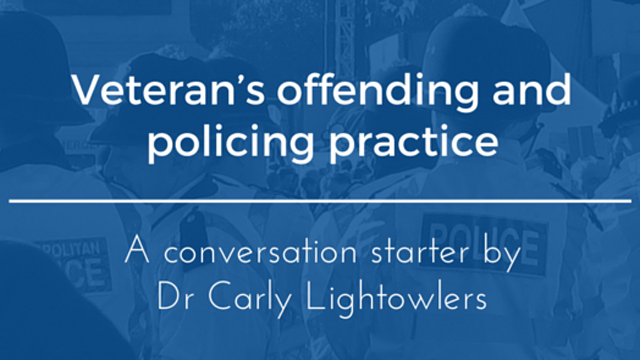
Veteran’s offending and policing practice: a conversation starter
Purpose
This briefing aims to start a meaningful conversation about furthering our understanding of policing practice in relation to military veteran offenders.
Background
It has been acknowledged that in in the current context of the UK being amid a “war on terror” and in the wake of military operations in Iraq and Afghanistan and the conflict in Syria there has been in an increase in the number of veterans ending up coming to the attention of the criminal justice system. Although accurate data are limited, veterans are increasingly being represented in the criminal justice system (CJS) for offences after having been discharged, especially in relation to violent and sexual offences [1-4].
It is recognised that service provision is currently failing to respond adequately to this issue due to a gap in practice knowledge about this population. This has been acknowledged by the Ministry of Justice (MoJ) [5], as Prison and Probation practitioners are struggling to response adequately to the complex needs of veterans. The Probation Service and newly formed CRCs are currently leading the way in exploring how to respond to this populations’ unique set of needs within the CJS. And understanding is increasing with regards to armed service personnel in prison [6]. However, any discussion of this population is absent in both current policing policy and discourse as well as in academic research: despite veteran offenders being likely to come to the attention of the Police before they come into contact with Prison and Probation services.
I suggest this is an opportunity missed to fully consider the pathways through which veterans resort to offending and become embroiled in the CJS as the Police are likely to be the first agents of the CJS who come into contact with this group when they offend. A thorough exploration of the contact the police have with this population and the challenges presented for police when dealing with ex-military personnel and veterans would provide a unique insight into the nature of extent of the problem. Indeed, there are likely to be unique challenges for policing this population and dealing with this population on arrest, given their training in the use of force and violence and their potential exposure to situations of extreme violence and victimization, these may be further compounded by mental health and problematic alcohol consumption. The purpose of this paper is to start a conversation as to what is known about this group from a policing perspective and to start talking about the challenges this group presents for Policing practice.
Discussion
The veteran population are disproportionately likely to present challenges for police in terms of violent behaviour and offences. Many of these offences may be alcohol-related, given that a review of alcohol use in the UK and US military suggested that many service personnel rely on alcohol to mediate the transition from combat to safety in civilian life [7]. However the extent and mechanisms of the association between alcohol use and violent behaviour in this population remains unknown. Mental health problems, due to circumstances prior to, during, or post military service (such as depression and Post-Traumatic Stress Disorder (PTSD)) further confound this relationship [8]. Issues of homelessness may also present challenges for police dealing with this population.
In essence, a better understanding of the nature and extent of the problem as well as the heterogeneity in veteran offenders and the complexity of their behaviour, including alcohol consumption and mental health difficulties will help direct decisions about the nature and form of policing interventions and service provision and ways in which offending in this population could be ameliorated at both the national and local level. Further understanding would assist in designing targeted and tailored service provision specific to this group’s needs and effective solutions may involve working with other public service partners in health, housing and the charitable sector to reduce the chances of this population coming into contact with the police or ending up in prison.
Recommendations
There is an urgent need for co-produced research between police and academics into veteran’s offending to better inform strategic policing practice in relation to veterans. The N8 Policing Research Partnership provides a collaborative platform for academics and policing practitioners to progress such research which ought to focus on answering the following questions:
- What is the nature and extent of veteran contact with the police?
- What type of offences do veteran’s commit?
- What proportions of offences are flagged as alcohol-related or involving mental health difficulties??
- What are the challenges faced by police in dealing with this population?
- What assistance is needed from other organisations to do so effectively?
Useful methodologies for addressing these questions may include:
- Secondary data analysis of police arrest and charge data to explore the characteristics of veteran’s offenders, the prevalence of alcohol consumption and mental health difficulties identified as related to their offending. This quantitative analysis may also seek to compare whether veterans’ are more likely that non-veterans to come to the attention of the police for certain crime types and/or whether they are disproportionately likely to be involved in offending involving alcohol.
- Qualitative interviews with police to gain greater understanding of challenges faced when working with this population and any barriers to doing so effectively.
Prepared by Dr Carly Lightowlers, University of Leeds. Interested parties should make contact with the author to progress.
References
Note: This article gives the views of the author(s), and does not reflect the views or position of the N8 PRP, nor any of the partner organisations.









0 Comments